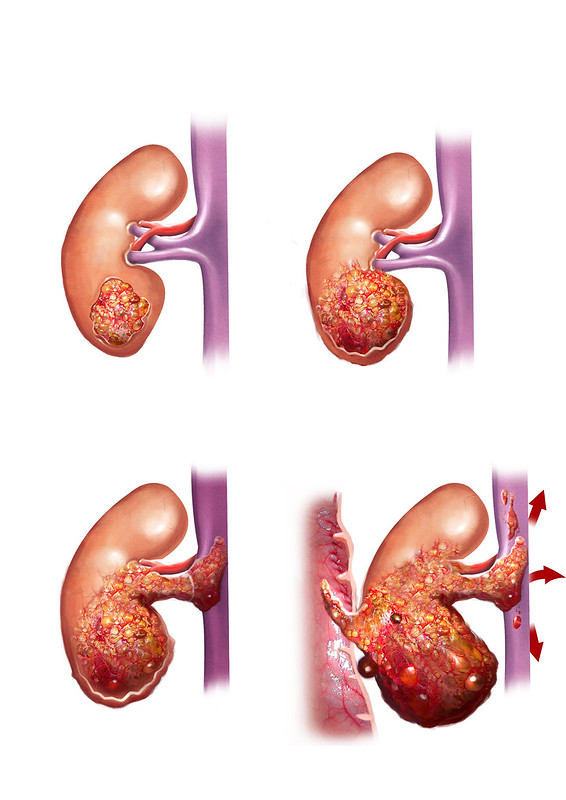SAN ANTONIO (June 3, 2020) — A team of researchers from The University of Texas Health Science Center at San Antonio confirmed the role of a certain protein in the development of high-grade kidney cancer. The researchers also showed that a higher level of the protein can be used as a marker to predict which tumors will develop treatment resistance and progress more rapidly.
Dharam Kaushik, MD, led the study published May 31 in the journal Translational Research.
Dr. Kaushik is an associate professor of urology in the Long School of Medicine at the university, also called UT Health San Antonio. He also is a genitourinary oncologic surgeon at the Mays Cancer Center, home to UT Health San Antonio MD Anderson.

“About 30% of patients with kidney cancer are not diagnosed until their cancer has spread to other parts of the body. Metastatic disease is notoriously resistant to current targeted therapies. In 2018, there were about 403,262 new cases of kidney cancer and 175,098 related deaths worldwide. Therefore, there is an urgent unmet need for developing new tools to predict which cancers will develop into high grade that are resistant to treatment,” Dr. Kaushik said.
In previous preclinical and animal studies the researchers proved that the protein — nicotinamide adenine dinucleotide phosphate (NADPH) oxidase-4 (Nox4) — often called Nox4, was involved in promoting the more serious cancer.
In the current study, the researchers studied the treatment records of 350 patients who had kidney cancer between January 2013 and June 2016. Their results showed that Nox4 also concentrates in the nucleus of human kidney cancer cells. The findings were bolstered by a series of statistical analyses using clinical data of patients who survived or died from kidney cancer. The combined results suggest that nuclear Nox4 expression may be an independent marker of disease progression and poor survival in patients with high-grade, advanced-stage kidney cancer.
“Our analysis showed that a high level of nuclear Nox4 is an important marker predicting resistance to targeted therapy. To our knowledge, this is first report of nuclear Nox4 localization and the correlation with disease progression, poor survival and development of resistance to targeted/immune therapy in kidney cancer,” he said.
During the study, the researchers also identified a smaller group of patients with high levels of nuclear Nox4 who had rapid disease progression or died within six months of surgery. “These patients would be ideal candidates for a future study of survival outcomes using adjuvant targeted therapy that includes a Nox4 inhibitor.” Dr. Kaushik said.
Dr. Kaushik is the lead and corresponding author for the study. Ronald Rodriguez, MD, PhD, also from the Department of Urology, is the senior author. Co-authors from UT Health San Antonio include post-doctoral fellow Keith A. Ashcraft, PhD, Hanzhang Wang, Michael A. Liss, MD, Deepak Pruthi, MD, Ahmad A. Mansour, MD, Wasim Chowdhury, MS, Dean Bacich, PhD, Amanda L. Watson, PhD, the late Denise O’Keefe, PhD, all from the Department of Urology; Karthigayan Shanmugasundaram, PhD, from the Department of Molecular Medicine; and Alia Nazarullah, MD, and Gabriela Gonzalez, MD, from the Department of Pathology. Other authors include Hao Zhang from the Department of Cellular and Molecular Medicine at the University of Arizona, Phoenix, Ariz., and Karen Block, PhD, from the Office of Research and Development at the Department of Veterans Affairs in Washington, D.C.
The Littenberg Foundation funded the study. Tissue Microarray construction and Aperio imaging were performed using the Mays Cancer Center’s Genomics Shared Resource Facility supported by UT Health San Antonio.
# # #
The Mays Cancer Center, home to UT Health San Antonio MD Anderson Cancer Center, is one of only four National Cancer Institute-designated Cancer Centers in Texas. The Mays Cancer Center provides leading-edge cancer care, propels innovative cancer research and educates the next generation of leaders to end cancer in South Texas. Visit www.UTHealthsaMDAnderson.org.


